The Intel 9th Gen Review: Core i9-9900K, Core i7-9700K and Core i5-9600K Tested
by Ian Cutress on October 19, 2018 9:00 AM EST- Posted in
- CPUs
- Intel
- Coffee Lake
- 14++
- Core 9th Gen
- Core-S
- i9-9900K
- i7-9700K
- i5-9600K
CPU Performance: Office Tests
The Office test suite is designed to focus around more industry standard tests that focus on office workflows, system meetings, some synthetics, but we also bundle compiler performance in with this section. For users that have to evaluate hardware in general, these are usually the benchmarks that most consider.
All of our benchmark results can also be found in our benchmark engine, Bench.
PCMark 10: Industry Standard System Profiler
Futuremark, now known as UL, has developed benchmarks that have become industry standards for around two decades. The latest complete system test suite is PCMark 10, upgrading over PCMark 8 with updated tests and more OpenCL invested into use cases such as video streaming.
PCMark splits its scores into about 14 different areas, including application startup, web, spreadsheets, photo editing, rendering, video conferencing, and physics. We post all of these numbers in our benchmark database, Bench, however the key metric for the review is the overall score.
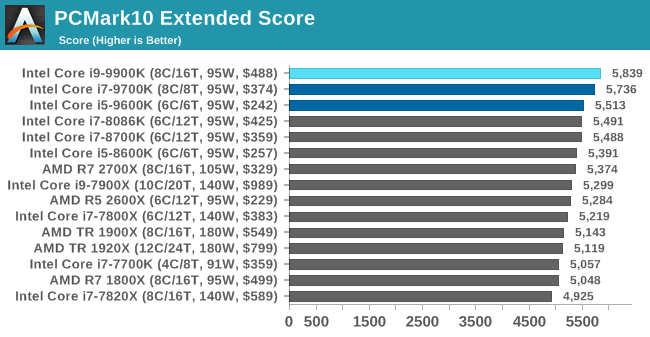
As a general mix of a lot of tests, the new processors from Intel take the top three spots, in order. Even the i5-9600K goes ahead of the i7-8086K.
Chromium Compile: Windows VC++ Compile of Chrome 56
A large number of AnandTech readers are software engineers, looking at how the hardware they use performs. While compiling a Linux kernel is ‘standard’ for the reviewers who often compile, our test is a little more varied – we are using the windows instructions to compile Chrome, specifically a Chrome 56 build from March 2017, as that was when we built the test. Google quite handily gives instructions on how to compile with Windows, along with a 400k file download for the repo.
In our test, using Google’s instructions, we use the MSVC compiler and ninja developer tools to manage the compile. As you may expect, the benchmark is variably threaded, with a mix of DRAM requirements that benefit from faster caches. Data procured in our test is the time taken for the compile, which we convert into compiles per day.
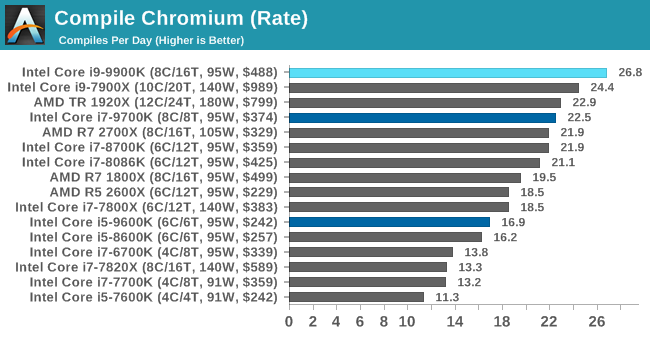
Pushing the raw frequency of the all-core turbo seems to work well in our compile test.
3DMark Physics: In-Game Physics Compute
Alongside PCMark is 3DMark, Futuremark’s (UL’s) gaming test suite. Each gaming tests consists of one or two GPU heavy scenes, along with a physics test that is indicative of when the test was written and the platform it is aimed at. The main overriding tests, in order of complexity, are Ice Storm, Cloud Gate, Sky Diver, Fire Strike, and Time Spy.
Some of the subtests offer variants, such as Ice Storm Unlimited, which is aimed at mobile platforms with an off-screen rendering, or Fire Strike Ultra which is aimed at high-end 4K systems with lots of the added features turned on. Time Spy also currently has an AVX-512 mode (which we may be using in the future).
For our tests, we report in Bench the results from every physics test, but for the sake of the review we keep it to the most demanding of each scene: Ice Storm Unlimited, Cloud Gate, Sky Diver, Fire Strike Ultra, and Time Spy.
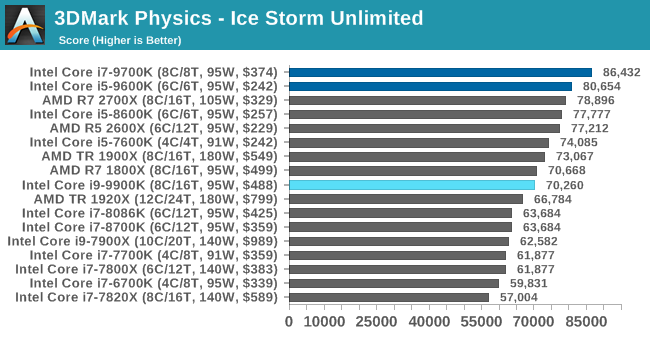
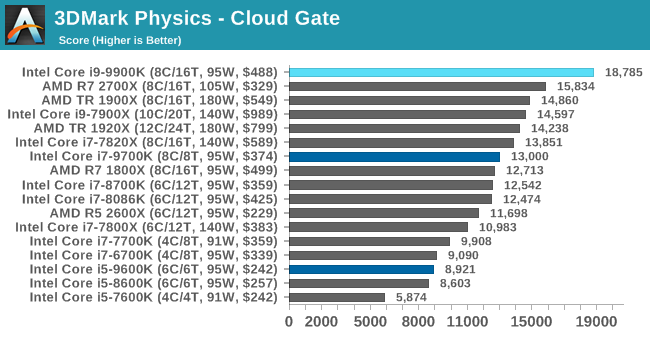
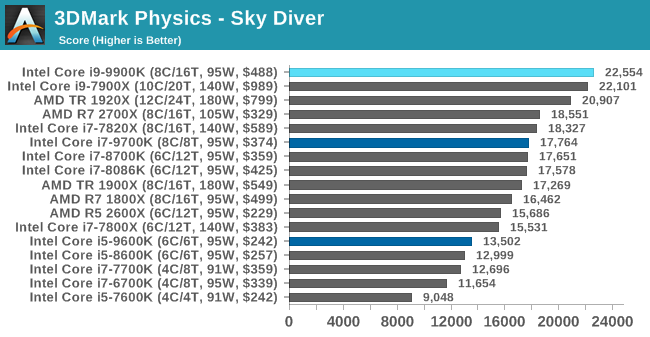
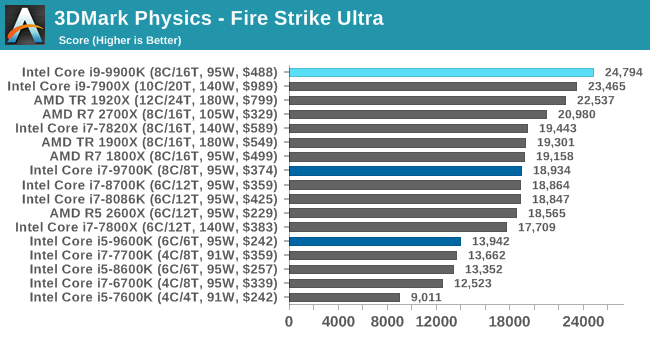
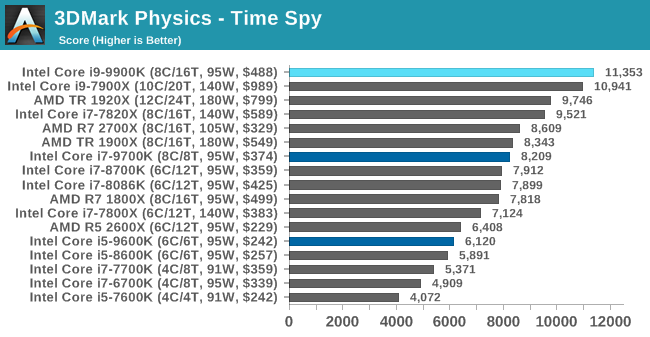
The older Ice Storm test didn't much like the Core i9-9900K, pushing it back behind the R7 1800X. For the more modern tests focused on PCs, the 9900K wins out. The lack of HT is hurting the other two parts.
GeekBench4: Synthetics
A common tool for cross-platform testing between mobile, PC, and Mac, GeekBench 4 is an ultimate exercise in synthetic testing across a range of algorithms looking for peak throughput. Tests include encryption, compression, fast Fourier transform, memory operations, n-body physics, matrix operations, histogram manipulation, and HTML parsing.
I’m including this test due to popular demand, although the results do come across as overly synthetic, and a lot of users often put a lot of weight behind the test due to the fact that it is compiled across different platforms (although with different compilers).
We record the main subtest scores (Crypto, Integer, Floating Point, Memory) in our benchmark database, but for the review we post the overall single and multi-threaded results.
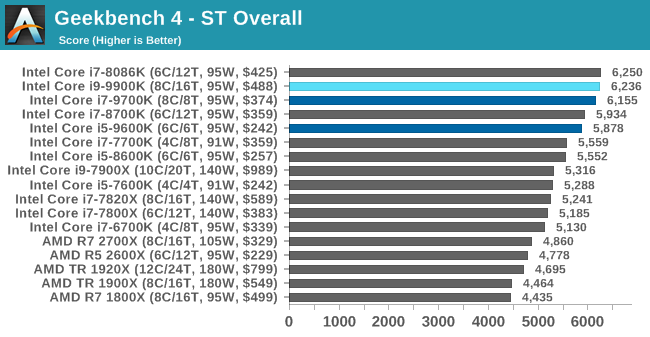
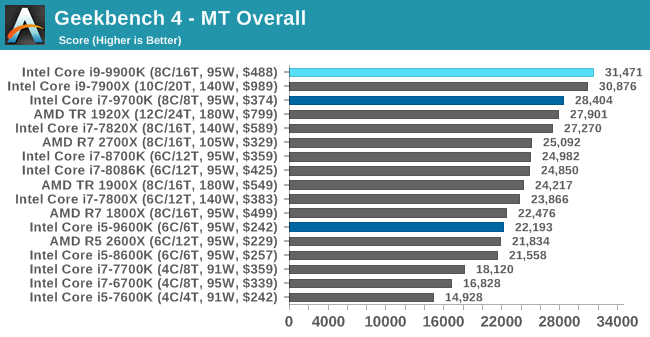










274 Comments
View All Comments
The Original Ralph - Saturday, October 20, 2018 - link
sorry, B&H's availability date should be JAN 1, 2100eastcoast_pete - Saturday, October 20, 2018 - link
JAN 1, 2100? Intel's manufacturing problems must be at lot more serious than we knew (:I wonder if the 9900K will be supported by "Windows 21" when they finally ship?
cubebomb - Saturday, October 20, 2018 - link
you guys need to stop posting 1080p benchmarks for games already. come on now.gammaray - Sunday, October 21, 2018 - link
I agree, 1440p and higher, especially with the top CPUsmapesdhs - Sunday, October 21, 2018 - link
They would of course respond that they have to show 1080p in order to reveal CPU differences, even if the frame rates are so high that most people wouldn't care anyway. I suppose those who do game at 1080p on high refresh monitors would say they care about the data, but then the foundation of the RTX launch is a new pressure to move away from high refresh rates, something the aforementioned group of gamers physically cannot do.piroroadkill - Monday, October 22, 2018 - link
They need to show a meaningful difference between CPUs. setting a higher resolution makes the tests worthless, as you'll just be GPU bottlenecked.eva02langley - Monday, October 22, 2018 - link
They are important since they bring in perspective CPU bottleneck, however it is widely overpreached.1080p, 1440p and 2160p at max settings... enough said. Without multiple resolutions benchmarks, it is impossible to get a clear picture of the real performances to expect from a potential system.
However, basically, a value rating system is now MANDATORY. It doesn't make any sense that the 9900k received 90% + score on Toms and WCCF. They offer abysmal value for gamers, so it is not "The Best Gaming CPU", however it is the "strongest"
DominionSeraph - Monday, October 22, 2018 - link
It's $110 over the i7. If you're looking at a $2500 i7 rig, going to $2610 with an i9 is a 4% increase in price. Looks to me like it generally wins by over 4%. That's a really good value for a content creator since it stomps the i7 by over 20%.Chestertonian - Wednesday, February 27, 2019 - link
No kidding. Why are there barely any 1440p benchmarks, but there are tons of 8k benchmarks? I don't get it.avatar-ds - Sunday, October 21, 2018 - link
Something's fishy with the 8086k consistently underperforming the 8700k in many (most?) gaming tests by more than a margin of error where differences are significant enough. Undermines credibility of the whole thing.